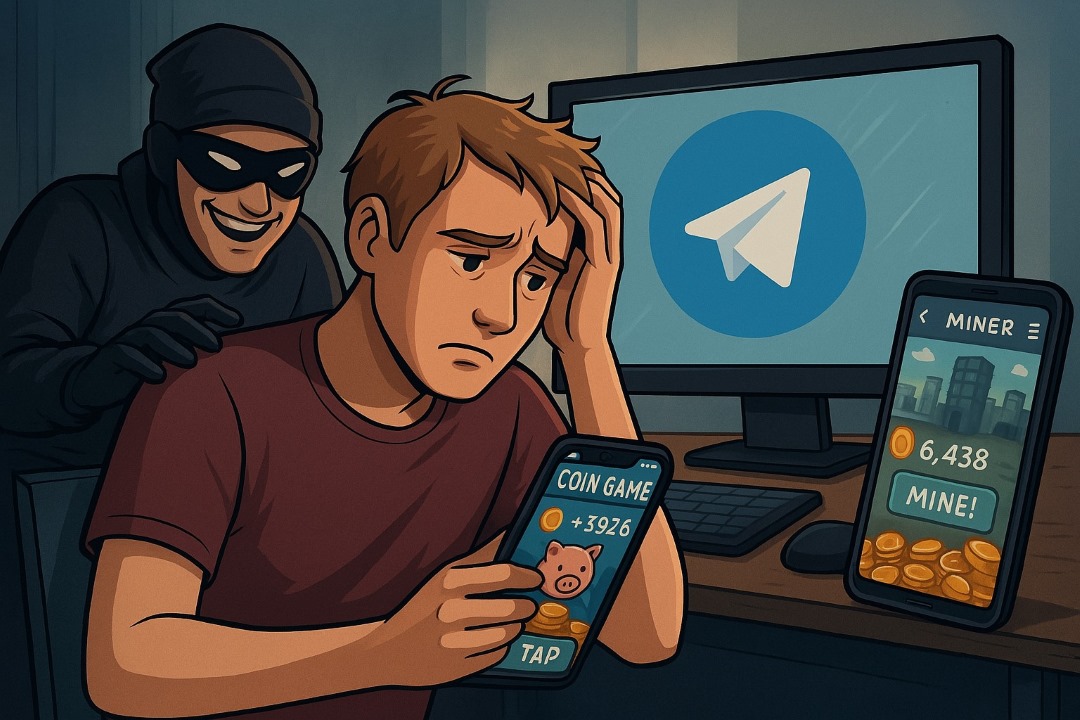Telegram isn’t just a messaging app anymore—it’s become a digital frontier full of communities, bots, financial tools, and, lately, “games” that promise real-world rewards. You’ve probably seen them: tap-to-earn clickers, crypto-mining simulators, or investment-style games that tell you to invite friends, deposit coins, and watch your money grow. Sounds familiar, right?
The rise of these Telegram-based games has been meteoric. They’re quick to join, easy to play, and often disguise themselves as part of the larger crypto and Web3 movement. And to be fair, they don’t all look shady at first glance. Some come with slick UIs, clever mechanics, and even branding partnerships that give them a temporary aura of legitimacy. But scratch beneath the surface, and you’ll find a different reality—a web of manipulation, false promises, and in some cases, outright theft.
Telegram games have become a breeding ground for scams, and the reasons are multifaceted. The lack of oversight, anonymity of developers, untraceable wallets, and built-in virality of social sharing all create the perfect storm. And while many users jump in looking for easy gains, they often walk away with empty wallets or compromised personal information.
This article dives deep into how these scams work, the warning signs, and why Telegram itself—despite being a platform of innovation—can’t keep up with the wave of predatory gaming bots and fake earning apps that have flooded its ecosystem. If you've ever considered trying one of these games, you’ll want to read this first.
The Rise of Telegram-Based Games
Telegram’s flexibility as a platform is one of its greatest strengths. Unlike WhatsApp or Messenger, it allows developers to integrate bots, create inline games, and even manage crypto wallets through third-party plugins. That openness led to the creation of a new micro-genre: games designed specifically to be played within Telegram chats.
Many of these games exploded in popularity during crypto booms. With themes like "tap to mine", "click to earn", or "invest to grow", they appealed to casual users curious about making quick money with little effort. The barrier to entry was almost non-existent. Just tap a link, start the bot, and boom—you’re playing. No downloads, no registration. This frictionless onboarding made them viral almost overnight.
Telegram’s native design supports this. Bots can send notifications, automate messages, and even simulate complex economies inside group chats. When combined with referral incentives—“Invite 5 friends and earn 10x more!”—these games began spreading like wildfire.
The games themselves range from idle clickers and mining simulators to pseudo-casinos, trading platforms, or faux metaverse builders. Many are visually barebones, but that's intentional. The minimalist approach makes them fast, lightweight, and hard to distinguish from other Telegram tools or bots.
For developers or scam operators, the formula was irresistible: easy to build, no app store review, instant user engagement, and the promise of quick profits on both ends. But for players, the honeymoon didn’t last. As more people started playing—and losing—they realized something wasn’t right.
Common Scams Associated with Telegram Games
Fake Investment Opportunities
One of the most widespread scam types within Telegram games revolves around fake investment schemes. These games dangle the promise of passive income—earn crypto while you sleep, multiply your tokens overnight, or unlock premium upgrades that “boost” your profits tenfold.
The catch? You need to invest real money first. Maybe it's $10 to buy a mining rig, or $50 to access a VIP zone, or even small gas fees to “unlock” your wallet. Once users make that deposit, two things usually happen: either the bot continues to simulate returns (so you’ll invest more), or it stops responding altogether.
And when people try to withdraw their funds? That’s when the games reveal their true nature. Either the payout is perpetually "pending", or you're asked to pay an additional "network fee" to release your earnings—one final squeeze before the scammer disappears for good.
Phishing and Data Theft
Some games don’t even bother with the money upfront. Instead, they go after something more valuable: your data. Players are asked to link their wallets, input recovery phrases, or log in with Telegram credentials on an external page that mimics a legitimate service. The moment you do, your wallet is drained, your account hijacked, or your identity sold on the dark web.
What’s particularly dangerous is how these games blend with real crypto projects. They’ll copy design language from popular DeFi apps, use stolen logos, and build fake Twitter accounts to look credible. Even experienced users have been caught off guard.
Ponzi and Pyramid Schemes
Then there are the so-called “network marketing games” where users earn tokens by recruiting others. The more friends you invite, the more you supposedly earn. On the surface, it looks like growth. But in truth, it's a pyramid scheme with no product or real value—just a rotating cycle of deposits flowing upward.
This model only works as long as new users keep joining. Once recruitment slows, the system collapses. Early adopters cash out, and everyone else is left with worthless points, unfulfilled promises, and empty wallets.
Malware Distribution
Finally, some games aren’t games at all—they’re just a front for distributing malicious software. These bots may send infected files, ask users to download fake clients, or even inject malware through browser redirects. Once installed, they can log keystrokes, steal personal files, or use your device for crypto mining without your knowledge.
Telegram's API makes it easy to simulate buttons and actions, which scammers exploit to make malware distribution look like gameplay. And because most users don’t associate Telegram with viruses, their guard is often down.
Case Studies: Real-Life Examples of Telegram Game Scams
Hamster Kombat, Yescoin, and TapSwap were among the most viral Telegram “games” that promised future token launches. They encouraged users to tap endlessly for in-game coins, claiming these would one day be convertible to real crypto. Users were told: "Keep tapping, invite friends, and you’ll be early to the next big token drop."
Thousands joined. But no blockchain project ever materialized, and the developers vanished.
In another case, a bot called CryptoFarm claimed to simulate a mining economy. Players were given daily tokens and asked to "upgrade" their mines by depositing USDT. One player invested over $1,000 expecting long-term passive rewards. The platform was gone in a week.
Then there was Moon Clicker, which allowed users to earn BTC satoshis for completing simple tasks and reaching milestones. Withdrawals were supposedly “under review” for weeks—until the bot vanished completely, taking tens of thousands of dollars in fake deposits with it.
Telegram’s structure enables these disappearances. There's no real user review system, no app store moderation, and no accountability once a bot goes offline. The operators simply delete the account or rename it and start again with a new identity.
Why Telegram Is a Breeding Ground for These Scams
The success of scam-based games on Telegram isn’t just about opportunistic developers—it’s about a platform that, by design, makes it almost too easy. Telegram, unlike more regulated ecosystems like Google Play or the App Store, has no review process for bots or mini-games. That openness has been both its strength and its Achilles’ heel.
Anonymity and Lack of Regulation
Telegram was built with privacy in mind. You can create an account without using your real name, host channels with tens of thousands of users, and deploy bots with almost no trace of the human being behind them. While this has helped dissidents and activists in oppressive countries, it’s also opened the door for scammers to operate under layers of digital fog.
When you play a Telegram game, you’re often interacting with a bot created by an unknown developer, hosted somewhere in a datacenter you’ll never locate, connected to a wallet you’ll never trace. If you send funds, and the game vanishes the next day, there’s no recourse. No customer support. No report button that guarantees any action.
Low Barrier to Entry for Developers
Creating a Telegram game bot takes only basic coding skills. Many developers use open-source templates or even AI tools to spin up clicker-style games within hours. The art can be copied, the structure duplicated, and the entire game loop designed in just a few lines of code.
Compare that to app stores, where you must submit your game, pass security checks, and often register as a business entity. Telegram requires none of that.
Worse, the same bot can be cloned dozens of times. If it gets exposed or reported, the scammer just changes its name, tweaks a few icons, and relaunches under a new identity.
Viral Mechanics + Crypto Buzz = Perfect Storm
Telegram’s channel forwarding and referral systems are ideal for viral growth. A user earns more coins by inviting friends. Each tap brings more “profit.” Add buzzwords like “Web3,” “airdrops,” or “token listing,” and people get excited—even if there’s nothing behind it.
Scammers know this. They ride the hype of crypto surges and build games that look like they’ll pay off. And since Telegram lets people send links instantly to groups, channels, and even strangers, bad actors don’t need marketing budgets. They use you to spread the scam.
Red Flags: How to Spot a Telegram Game Scam
Not every game that looks shady is a scam, but in this space, skepticism is healthy. There are several red flags you can look out for when trying to evaluate whether a Telegram game is legitimate or just another trap:
1. Promises of Guaranteed or Fast Returns
If the game tells you you'll earn $100 in a week for tapping a screen or "just inviting 5 friends," it’s probably not legit. Real crypto or NFT projects involve market risk, competition, and often require actual gameplay or strategy—not just blind interaction.
2. Requests for Wallet Seed Phrases or Private Keys
No legitimate game should ever ask you for your 12-word recovery phrase or private key. If a bot does this, it’s not even a grey area—it’s straight-up theft in progress.
3. Unclear Developer Identity
A serious project will usually have a website, a GitHub repo, a public roadmap, or named team members. If the developers are anonymous, the whitepaper is vague, and the only link is a Telegram handle—you’re playing in dangerous waters.
4. Withdrawal Conditions That Keep Changing
Scam games often allow you to “earn” for days, then when you try to withdraw, they hit you with vague requirements: deposit more to unlock withdrawals, pay a gas fee, or reach a new level. These are psychological tactics to keep you engaged until you give up or the project disappears.
5. No External Audits or Listings
Legit P2E projects often have code audits, listings on coin aggregators (like CoinMarketCap or CoinGecko), and are discussed on serious forums. If no one’s talking about the project outside of Telegram—it’s probably not real.
 Telegram's Response and Where It Falls Short
Telegram's Response and Where It Falls Short
Telegram has tried to combat scammy activity over the years. It has a reporting function, verification badges, and in some cases, has removed bots or channels tied to known fraud. However, these measures are reactionary, not preventative.
Telegram simply doesn’t have the infrastructure—or perhaps the incentive—to moderate the thousands of game bots being created every day. Unlike app stores, there's no review board. And unlike blockchain explorers, there's no transparency into how game earnings are handled. Users are left to fend for themselves.
Even when projects are reported, Telegram rarely responds publicly. Many bots operate for weeks or months before action is taken—by which time, they’ve already scammed thousands of users.
The bigger issue is systemic. Telegram has positioned itself as a neutral platform—one that champions privacy and free development. And while those values are important, they’ve also allowed scammers to thrive. Without proactive moderation, smart filtering tools, or verified developer programs, the platform will continue to be a playground for fraud
What Players Can Do Instead
If you’re tempted by Telegram games, you’re not alone. The concept is addictive: a game inside a messaging app, always accessible, promising effortless income with every tap. But that’s exactly what makes them dangerous. These games weaponize simplicity—you don’t need a wallet, account, or even to leave the chat. Just play. Just trust.
But in 2025, digital trust is no longer a casual affair. If you’re genuinely interested in earning from gaming, there are far better and safer options out there.
Look Toward Legitimate Play-to-Earn Games
There are real, audited, and transparent blockchain games out there—many of which we’ve covered in our article on [Best 15 Play-to-Earn Games to Make Real Money]. Titles like Gods Unchained, The Sandbox, or Illuvium may require more effort and research, but they offer actual ownership, regulated ecosystems, and verified earnings.
Stick to Platforms with Oversight
Games found on Steam, Epic Games Store, or even Google Play must pass basic safety requirements. Even in the crypto space, platforms like Immutable X or Polygon Studios partner with vetted projects.
Telegram, by contrast, has zero entry barriers—and that’s exactly why scammers flood it with fake games. If there’s no background check, no listing standards, and no recourse for fraud, then you, the player, are the only defense.
Use Hardware Wallets and Avoid Blind Connections
Even if you're curious and want to explore some of these games, never connect your primary crypto wallet to a Telegram bot. Use a burner wallet with no funds. Better yet, don’t connect anything until you’ve done due diligence—and even then, proceed with caution.
Final Word: Don't Tap Blindly
The appeal of Telegram games is emotional. They offer a whisper of hope—“You can earn while you chat,” or “this could be your early ticket to the next crypto moonshot.” And when thousands of people are posting their "earnings," it's easy to feel like you're missing out. But that illusion is part of the scam.
Here's the hard truth: if it sounds too easy to be real, it probably is.
Telegram games don’t pay you for your time—they exploit it. They trade your taps for your trust, your clicks for your data, and your hopes for your money.
We’ve seen this pattern before: in shady mobile ads, in fake trading bots, in phishing campaigns dressed up as games. Telegram just made it faster, sleeker, and more socially viral.
That doesn’t mean the whole platform is bad. There are genuine communities, useful bots, and niche tools built on Telegram that serve millions of people. But games? Games that ask you to mine, invite, or invest with no product or roadmap? Those are usually not games at all—they’re traps wearing game skins.
So if you ever find yourself 30 minutes deep into a clicker that swears you’re just one step away from a payout, stop. Breathe. Ask yourself: Has anyone actually been paid? Is there a whitepaper? A real team? Any listings? Any external verification?
Because if the only place the game exists is inside a Telegram chat...
That’s not a game. That’s bait.








